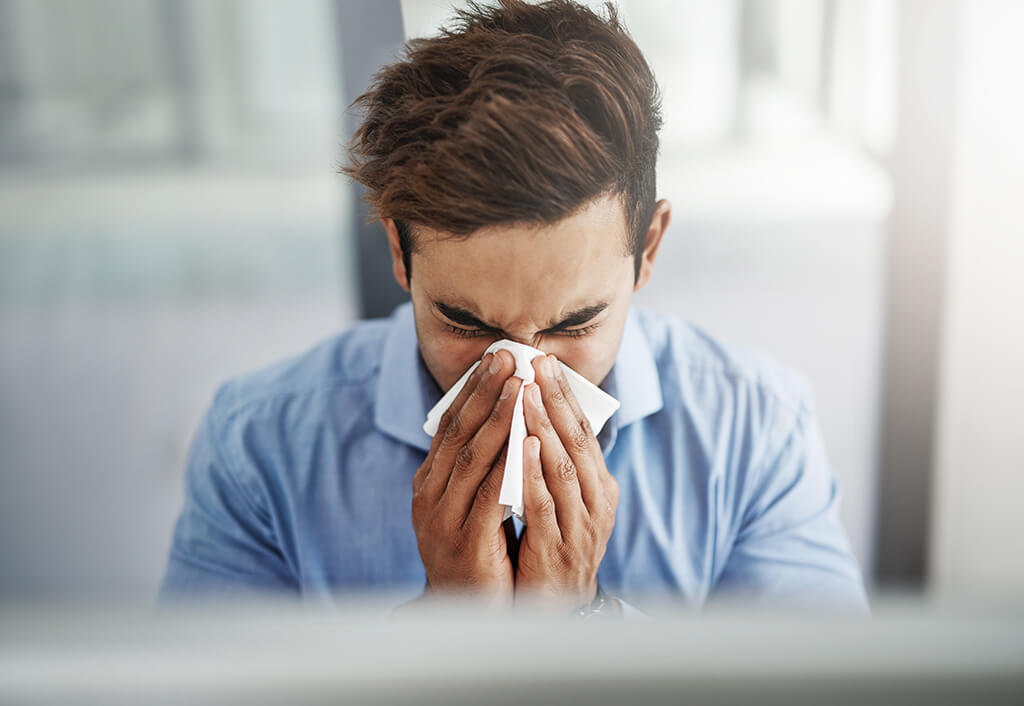Runny Nose Causes, Symptoms and Treatments
The most common time we think about our noses is during cold and flu season, but a runny nose could be a year-round problem. A runny nose is likely the result of something called “allergic rhinitis”—which is an inflammation of your nasal lining.
Symptoms and causes of a runny nose
To find the best way to help get rid of a runny nose, let’s focus on the causes and other symptoms first.
The common cold and the flu
These are infections that develop after a virus makes its home in your upper respiratory tract, meaning your mouth, nose, sinuses, and throat. As your cold or flu gets worse, you’ll experience inflammation and irritation of your upper respiratory tract, which then snowballs into increased mucus production—and that’s your runny nose.
Upper respiratory allergies
Smoke, pollen, and other particles in the air can signal your immune system to create a response to the inflammation, which leads to cold-like symptoms, like a runny nose, without you having an actual cold infection.
Bodily reactions
There are some less obvious triggers for a runny nose, as well. Stress, hormone fluctuations, exposure to overly hot or cold weather, pungent smells, certain foods, and medication can make your nose run.
How to get rid of a runny nose
Before you reach for tissues, consider that blowing your nose too hard could actually further irritate your nasal lining. To give your nasal passages a break, it may help to hold a tissue under your nose to catch the dripping—or try only blowing one nostril at a time. Another way to experience temporary relief is to use a neti pot or inhale steam.
If your runny nose stems from a cold or flu, here are the steps for longer-lasting relief.
Get plenty of rest
Getting lots of rest is important for an infection. Manage your symptoms with a doctor-approved, over-the-counter anti-histamine medication so you can get some good-quality sleep.
Stay hydrated and eat healthy
Help give your immune system a boost so it can do its job better. Drink lots of fluids and eat healthy foods.
Clear the air
An air purifier can help to remove allergens and irritants that may prolong a runny nose and nasal congestion. This may also relieve your of a runny nose between colds.
Use a cough, cold, or flu medication
To really help kick a runny nose to the curb, look for products containing pseudoephedrine HCl or phenylephrine HCI (which are both nasal decongestants), which are found in most of the products in the Maximum Mucinex® Fast-Max® line of products.
A runny nose can be annoying, but with the right treatments it doesn’t have to keep you reaching for tissues for too long.
-
- https://www.mucinex.com/blogs/cold-flu-symptoms/got-a-runny-nose-causes-symptoms-and-treatments
- https://goaskalice.columbia.edu/answered-questions/nose-wont-stop-running
- https://www.health.harvard.edu/diseases-and-conditions/allergic-rhinitis-your-nose-knows
- https://www.nyee.edu/patient-care/medical-information/p/post-nasal-drip
- (hay fever/allergic rhinitis)
https://www.mayoclinic.org/diseases-conditions/hay-fever/symptoms-causes/syc-20373039 (symptoms of upper respiratory infection, i.e. mucus production overproduction) - https://www.healthline.com/health/acute-respiratory-disease#symptoms (upper respiratory allergies, not cold infection)
- https://www.healthline.com/health/allergies/allergies-or-cold#allergies (medications can make your nose run)
- https://www.verywellhealth.com/reasons-you-have-a-runny-nose-4110215 (neti pot and steam can help a runny nose)
- https://www.healthline.com/health/how-to-stop-a-runny-nose#bottom-line





